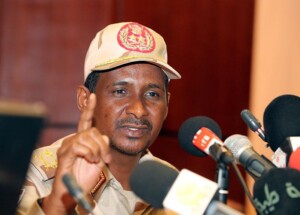Sudan military, politicians exchange accusations over coup attempt
Following the abortion of a coup attempt on Tuesday morning, military leaders Lt Gen Abdelfattah El Burhan and Lt Gen Mohamed Dagalo ‘Hemeti’ yesterday blamed the political forces for the crisis in the country. In response, government officials accused the military of stealing the revolution.
 Lt Gen Mohamed Dagalo ‘Hemeti’ addresses graduates at the Wadi Sayedna military base in Omdurman, September 21 (SUNA)
Lt Gen Mohamed Dagalo ‘Hemeti’ addresses graduates at the Wadi Sayedna military base in Omdurman, September 21 (SUNA)
Following the abortion of a coup attempt on Tuesday morning, military leaders Lt Gen Abdelfattah El Burhan and Lt Gen Mohamed Dagalo ‘Hemeti’ yesterday blamed the political forces for the crisis in the country. In response, government officials accused the military of stealing the revolution.
At a graduation ceremony of a new batch of Special Forces at the Wadi Sayedna military zone north of Omdurman on Wednesday, President of the Sovereignty Council and Commander of the Sudan Armed Forces (SAF), El Burhan accused the political forces of squabbling. “They are directing their arrows at the armed forces,” he said. “The criterion for selecting new members now is the capacity to insult the military.”
The army chief expressed his dissatisfaction about “the exclusion of the military component” from the The Way Forward programme of Prime Minister Abdallah Hamdok and the Friendship Hall initiative*.
“We left the executive work to the Council of Ministers two years ago, but we believe that the issue has deviated from the right track. [..] We are the guardians of the unity, security, construction and future of Sudan, despite anyone's objection,” he said, and repeated that the SAF will never accept “a monopoly of certain political forces ruling Sudan”.
El Burhan denounced the coup attempt on Tuesday early morning, and praised the wisdom of the armed forces that intervened without bloodshed. He warned against attempts to drive a wedge between the various military forces. “It was the regular forces that aborted the coup attempt. Yet, all the statements published about the coup attempt did not do justice to the armed forces.”
The vice-president of the Sovereignty Council and commander-in-chief of the paramilitary Rapid Support Forces (RSF**), Lt Gen Mohamed Dagalo ‘Hemeti’ told the new recruits that he holds the politicians in the country responsible for the repeated coups “because they neglected the people, their living situation and basic services while being preoccupied the division of positions, which created dissatisfaction among the people”.
He also regretted the lack of respect and appreciation for the armed forces, and condemned the insults directed “day and night” at all regular forces, while “We, the military, have not been not stingy with anything”.
‘More dangerous than the coup’
In a first reaction to the statements of the military leaders, Taha Osman Ishag, Member of the Anti-Corruption Committee for the Sudanese Professionals Association, said that the statements of El Burhan and Hemedti “are more dangerous than the coup itself”.
In a post on his Facebook page, Ishag likened El Burhan’s accusations to his speech in August last year in which the army commander blamed certain parties for attempting “to kidnap the revolution and its youth”. The official called for dealing with the crisis “in a responsible way, to reach a solution in the interest of the country, which we never achieve by this rhetoric of accusations and threats”.
Minister of Cabinet Affairs Khaled Omar said in a press statement yesterday that the three-year transitional period will end with free elections and the restructuring of Sudan’s military institutions.
He considered the statements made by the military “a threat to the democratic transition”, and said that El Burhan and Hemeti “forgot that the security situation is the responsibility of the military component”.
In his address to the Sudanese on Tuesday, PM Abdallah Hamdok called the coup a manifestation of the national crisis which confirms “the need to reform the security and military apparatus”.
Wajdi Saleh, member of the Committee for the Dismantling of the June 30 Regime, in a TV interview on Tuesday evening also called for “the restructuring of the military and security institutions, in order to purify them from the remnants of the defunct regime who hold and control them”.
‘No vision’
Waleed Madibo, founder and president of Sudan Policy Forum, told Al Jazeera from Doha, Qatar on Tuesday that “The question is not why there has been an attempt for a coup, the question is what are these officers trying to achieve.
“The legislative body was supposed to be formulated three months after the revolution, now it has been three years and there aren’t any signals that the civilian component of the government is trying to formulate that body,” he said. “It seems that there is a total lack of leadership and a total lack of vision that can lead the country out of this quagmire.”
* The Way Forward is an initiative launched by PM Hamdok in June this year, in an attempt to unify the democratic forces in the country. He cautioned against the growing divisions within the transitional bloc, the absence of a unified centre for decision making, a lack of priorities and common perceptions of the transition. In August, Hamdok announced the formation of a mechanism “to create a broad consensus” for the implementation of the initiative.
On September 8, this was followed by the signing of a Declaration of Unity of the Forces for Freedom and Change (FFC) yesterday by 43 parties and movements at the Friendship Hall in Khartoum. The declaration was signed in the presence of Hamdok and the civilian members of the Sovereignty Council. The civilian nature of the event was emphasised so the military component was not present. The PM called the signing of the declaration is “a historical event and a step on the right track” to the building of the democratic civilian state.
** The RSF was set up by the ousted Al Bashir regime in 2013 to fight against the armed movements in the country. Officially, the RSF was integrated into the Sudan Armed Forces (SAF) two years ago. In the August 2019 Constitutional Charter it was agreed that both the army and the RSF will fall under the command of the “Supreme Commander of the Sudan Armed Forces”. At the same time however, the militia stayed a force unto intself, commanded by Hemeti.











 and then
and then